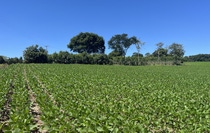Media
BASF and Solidaridad team up to empower Brazilian farmers to foster biodiversity
- Co-creation project to explore sustainable farming practices on soybean farms
- Long-term goal is to incentivize farmers to deliver nature-positive projects alongside existing agricultural practices
BASF and Solidaridad have partnered to understand how sustainable farming activities can have an increased effect on biodiversity, environmental conservation and the coexistence of agriculture and pollinators like bees. The project will be conducted within a network of small to mid-sized soybean farmers in Brazil. The partners will be supported by two organizations: GeoApis, to monitor managed bees and facilitate communication between farmers and beekeepers, and Wheatley Young Partners, to assess the feasibility of a nature-market in Brazil, where farmers are paid to deliver and maintain environmental service projects on their land. The first phase of the project started in January 2024 and is set to run for twelve months.
Soy production plays a crucial role in the global food and feed industry. However, its expansion has raised concerns about the loss of biodiversity in key regions, including Brazil, the world’s largest producer of soybeans. Recognizing the importance of sustainability, the partners want to address these challenges and drive positive change. “What is new about this project is the multi-stakeholder co-creation approach. We want to jointly develop metrics and practices to favor the creation of a biodiverse environment that are accepted and achieveable by all stakeholders – farmers, NGOs, the industry and other experts,” said Sergi Vizoso-Sansano, Senior Vice President BASF Agricultural Solutions Latin America.
The number of farms, metrics collected, and activities carried out will be defined jointly during the project. “We are very excited about this partnership, as the basis of our work is to support farmers to produce better and reduce the environmental impact of food production”, said Rodrigo Castro, Country Manager of Solidaridad in Brazil. “We will support small and medium-sized soybean farmers with technical assistance to enhance productive resilience and sustainability of the farms. Adjustments to activities carried out on the property, as well as new practices will be promoted to create a favorable context for biodiversity and production”, he added.
Particular focus of the project lies on pollinators like bees. Although most soybean varieties are bred to be self-pollinating, studies have shown that pollinating insects can have a positive impact on soybean production. Pollination or cross-pollination can increase yield by up to 12 percent by improving the seed set, or the number of seeds a plant produces per soybean pod.
“There can be downsides to food production when there is a lack of certainty, value, awareness, and access to the most sustainable practices. In a world where preserving biodiversity is critical for our future, we need to create solutions that integrate enhanced biodiversity on farms with productive agriculture. We are excited about the potential for nature-markets to incentivize farmers to improve their sustainable practices”, Vizoso-Sansano added.
Based on insights gained from the field, the partners will develop and test the feasibility of a nature-market in Brazil. The long-term goal is to create an ecosystem in which farmers are incentivized to deliver nature-positive projects alongside existing agricultural practices. For example, companies could meet their environmental goals by purchasing nature-positive credits through a market that pays farmers to deliver and maintain environmental projects and practices on their land.
About BASF’s Agricultural Solutions division
Everything we do, we do for the love of farming. Farming is fundamental to provide enough healthy and affordable food for a rapidly growing population, while reducing environmental impacts. That’s why we are working with partners and experts to integrate sustainability criteria into all business decisions. With €944 million in 2023, we continue to invest in a strong R&D pipeline, combining innovative thinking with practical action in the field. Our solutions are purpose-designed for different crop systems. Connecting seeds and traits, crop protection products, digital tools and sustainability approaches, to help deliver the best possible outcomes for farmers, growers and our other stakeholders along the value chain. With teams in the lab, field, office and in production, we do everything in our power to build a sustainable future for agriculture. In 2023, our division generated sales of €10.1 billion. For more information, please visit www.agriculture.basf.com or our social media channels.
About Solidaridad
Solidaridad is a civil society organization that makes international supply chains more sustainable. Its mission is to create a better perspective for farmers and workers in developing countries, while reducing impact on the environment. It envisions a world in which all we produce and consume can sustain us, while respecting the planet, each other, and the next generations. Across the globe, Solidaridad has over half a century of activity in more than 40 countries. In Brazil, it has developed sustainability initiatives with its partners for 15 years in the following chains: cocoa, coffee, sugarcane, yerba mate, orange, livestock, and soy. For more information, please refer to www.solidaridadnetwork.org.
P-24-142

